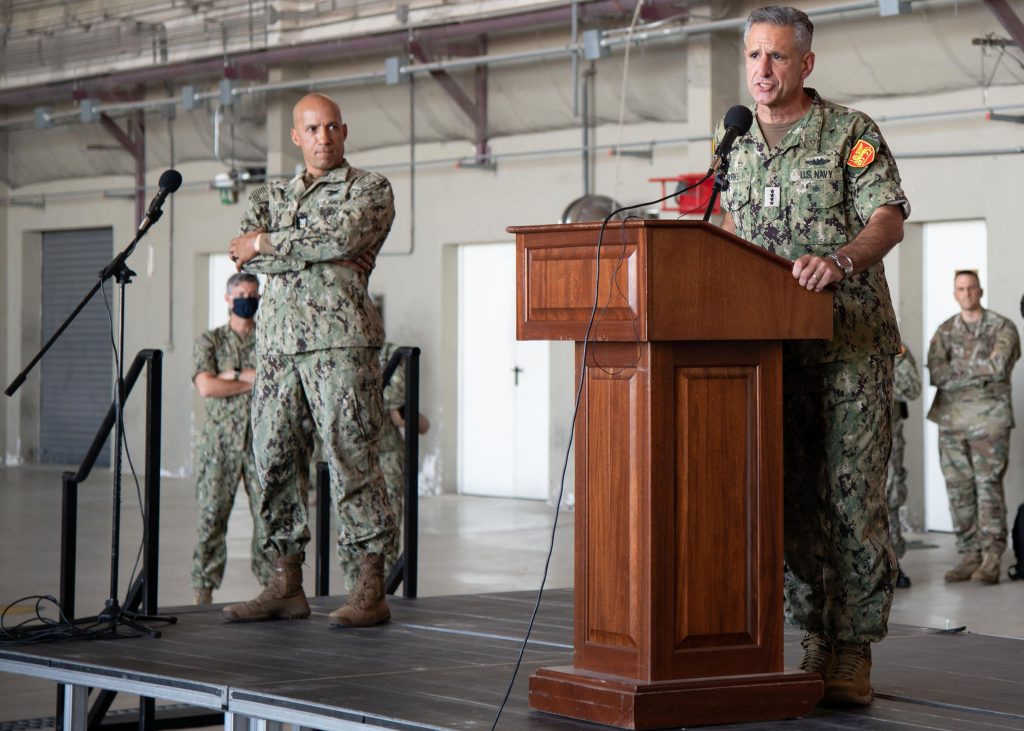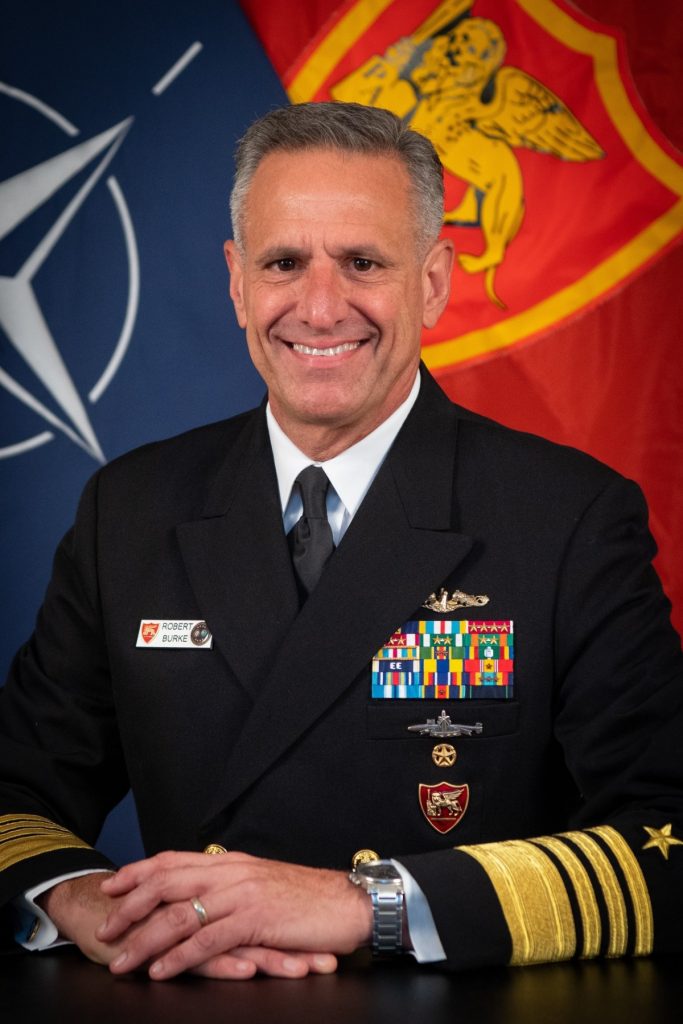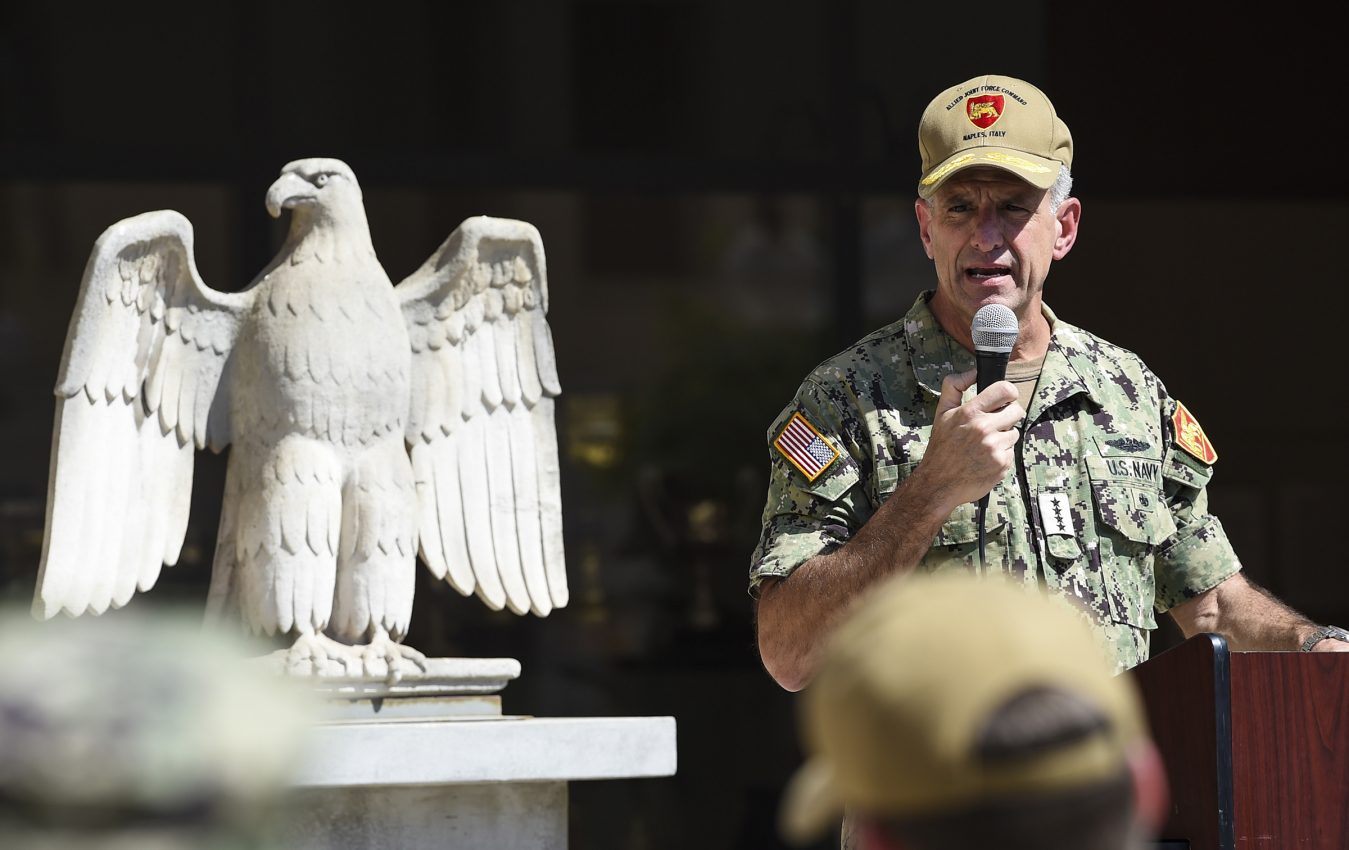Admiral Robert P. Burke, Commander of Allied Joint Force Command Naples, ahead of his first visit to Belgrade, said that “NATO and Serbia are close partners” and that the participation of Serbian officers in multinational peacekeeping missions is a joint success.
In an exclusive interview for the Council for Strategic Policy (cfsp.rs), Admiral Burke said that “Serbia is our neighbor, a reliable and valuable partner, which helps us promote peace and security in the region”, emphasizing that “the NATO-Serbia partnership is long-standing, since 2006 when Serbia joined NATO’s Partnership for Peace”.
Burke in his first visit to get a better sense of the region
In his first visit to the Western Balkans, during which he will visit KFOR in Pristina, Sarajevo and Belgrade, Admiral Burke said that he was coming here to get a better sense of the region, since stability and security of the Western Balkans is important for NATO.
“We always look to how to continue to strengthen our partnership, our well-established cooperation through NATO’s ongoing support to military reforms and capability building, and with joint efforts to ensure a peaceful and safe environment for all, which is a prerequisite for prosperity.”
A stable Kosovo is essential for stability in the region and for security
Admiral Burke said that the UN-mandated KFOR mission in Kosovo remains unchanged, and that “a stable Kosovo is essential for stability in the region and for our security”.
“For more than two decades, peace and stability in Kosovo have been a priority for NATO. We continue to support a safe and secure environment and freedom of movement for all communities in Kosovo, for the benefit of all people in Kosovo. The Alliance continues to also support the EU-facilitated dialogue between Belgrade and Pristina as the only path to a lasting solution to the issue”, said the Commander of Allied Joint Force Command Naples.
There are direct channels of communication with Serbia’s Chief of Defence
Regarding cooperation with the Serbian Armed Forces, Burke said that KFOR has established excellent dialogue with its Serbian interlocutors and there are direct channels of communication with Serbia’s Chief of Defence, General Milan Mojsilovic, which has been “really valuable and helped ensure mutual understanding and deconfliction”.
NATO helped Serbia and BiH in the fight against the coronavirus
Concerning the challenges arising from the COVID-19 pandemic, he said that this is an unprecedented challenge to all of our nations, and continues to have a profound impact on our people and our economies, and NATO has played a part in supporting the civilian response to this crisis.
“In the first half of this year, military forces from across the Alliance have flown more than 350 flights around the world to transport medical personnel and more than 1,000 tons of equipment. They also helped to set-up almost 100 field-hospitals and more than 25,000 treatment beds. NATO Allies have stood in solidarity. And they have helped each other out. But they have also delivered assistance to our partners, including Serbia and Bosnia-Herzegovina”, the Admiral said for cfsp.rs.
Below is the integral version of the interview and Admiral Burke’s biography.
- What is your role as JFC Naples Commander? What is the purpose of your visit? Can you explain why are you visiting Pristina, Sarajevo and Belgrade and not some other places?
As the Commander of JFC Naples, I direct a combined staff, representing NATO’s 30 Allies, responsible for planning, preparing, and conducting military operations throughout the Supreme Allied Commander Europe’s area of responsibility.
JFC Naples oversees four missions across the Western Balkans: The Kosovo Force (KFOR), NATO Headquarters Sarajevo, the NATO Liaison Office in Skopje, and the NATO Military Liaison Office in Belgrade. Established through the United Nations Security Council Resolution 1244 of 1999, to ensure a safe and secure environment and freedom of movement for the benefit of all communities in Kosovo, KFOR has been an enduring commitment to safeguard regional stability and Euro-Atlantic security. To this day, it is NATO’s largest mission in Europe. The other mentioned NATO entities located in Bosnia and Herzegovina, North Macedonia and Serbia carry out daily activities designed to strengthen our political dialogue and practical cooperation with these countries. All of these engagements are conducted alongside our partners in the EU, UN and OSCE. I’m pleased to report that we’ll be closing the NATO Liaison Office in Skopje at the end of March, following the successful completion of our objectives there and North Macedonia’s accession as NATO’s 30th member state. It was a tremendous honor to welcome North Macedonia to the Alliance last year – we truly are stronger together.
Allied Joint Force Command Naples was created as a part of NATO’s transformation, aimed at adapting the allied military structure to the operational challenges of Allied activities, in tackling the emerging threats of today. JFC Naples is one of three Joint Force Commands in the NATO Command Structure. Allied Joint Force Command, Brunssum, in The Netherlands and Allied Joint Force Command, Norfolk are the others. The new NATO Command Structure is leaner, more flexible, more efficient, and better able to conduct the full range of Alliance missions.
Nearly all NATO nations contribute to the JFC Naples military staff in order to deter aggression and to contribute to the effective defense of NATO territory and forces and to preserve or restore the security of NATO nations.
This is my first visit to the region, and I will visit KFOR in Pristina, Sarajevo and Belgrade. I expect it to be the first of many visits. The main purpose of the visit is for me to introduce myself and my team and meet with the NATO commanders and officials. I intend to explain what it is that we do, exchange views and ideas, improve our established channels of communication and explore possibilities to further advance our cooperation. Stability and security of the Western Balkans is important for NATO and for peace and stability in Europe. That is why I came here to get a better sense of the region. It’s important that we always look to how to continue to strengthen our partnership, our well-established cooperation through NATO’s ongoing support to military reforms and capability building and with joint efforts to ensure a peaceful and safe environment for all, which is a prerequisite for prosperity. Working together is something that improves us all, makes us better, stronger and more prepared to face the ever-changing and increasingly complex security challenges of today. We face the same security challenges in our shared Euro-Atlantic region, and dialogue and cooperation are important to address them effectively.
- Could you tell us more about NATO’s focus in the Western Balkans?
Since the end of the nineties, our forces in Kosovo have helped to keep peace and stability in the Western Balkans. Our offices in Sarajevo, Belgrade and Skopje promote political dialogue and carry out practical cooperation on a wide range of areas. These include – amongst others – reform of national security forces, structures and institutions; training and capacity-building, with the aim to make the military forces of these countries more capable to operate alongside Allied forces (in NATO-led missions and exercises); safe disposal of obsolete weapons; crisis response to natural emergencies; and scientific cooperation.
Our policies in the region – including our Open Door policy – are aimed at strengthening stability and building greater cooperation. We are determined to continue to help the countries of the region to implement reforms. This will benefit their citizens and the entire Euro-Atlantic family.

- KFOR mission falls under your command. How would you evaluate the role of KFOR in preserving peace, especially during the times of COVID pandemic? How did the mission adjust to the new conditions and how do you think the pandemic was handled by your troops on ground?
A stable Kosovo is essential for stability in the region and for our own security. For more than two decades, peace and stability in Kosovo have been a priority for NATO. The UN mandate for our KFOR peacekeeping mission – which derives from the UN Security Council Resolution 1244 of 1999 – remains unchanged. We continue to support a safe and secure environment and freedom of movement for all communities in Kosovo, for the benefit of all people in Kosovo. The Alliance continues to also support the EU-facilitated dialogue between Belgrade and Pristina as the only path to a lasting solution to the issue.
KFOR has established excellent dialogue with its Serbian interlocutors and we have direct channels of communication with Serbia’s Chief of Defence, General Milan Mojsilovic. These have been really valuable and help ensure mutual understanding and deconfliction. Security is a cooperative, team effort, so we work closely with all security partners. Teamwork is the ability to work together toward a common vision: A safe and prosperous region.
The COVID-19 pandemic is an unprecedented challenge to all of our nations, and continues to have a profound impact on our people and our economies. NATO has played a part in supporting the civilian response to this crisis. In the first half of this year, military forces from across the Alliance have flown more than 350 flights around the world to transport medical personnel and more than 1,000 tons of equipment. They also helped to set-up almost 100 field-hospitals and more than 25,000 treatment beds. Our Euro-Atlantic Disaster Response Coordination Centre has played a very important role in helping to provide relief to Allies and partners. We have been working closely with other international organizations, including the European Union and the United Nations, to ensure that our respective efforts were complementary and mutually reinforcing; and with the scientific community to develop creative solutions. So, NATO Allies have stood in solidarity. And they have helped each other out. But they have also delivered assistance to our partners, including Serbia and Bosnia-Herzegovina; and in various theatres of operation, including Kosovo, Afghanistan and Iraq.
Let me give you a few examples.
Turkey has provided masks, overalls and test kits to Serbia and other countries in the region.
The Czech Republic has worked closely with Serbia in the development of filters for masks. This was done under a NATO framework of cooperation amongst defense education institutions.
In Kosovo our KFOR mission has donated personal protective equipment to hospitals in Pristina and Gracanica and delivered more than 50 donations of food and clothing to 14 Kosovo municipalities, in coordination with local charities.
NATO has also taken steps to deal with the ongoing demands of the pandemic. Through the approval of a new operations NATO has established a trust fund for the purchase of urgently needed items and a stockpile of medical supplies.
Albania, the Czech Republic, Montenegro and North Macedonia have received dozens of ventilators, as well as around 1.5 Million euros in medical supplies from the stockpile.
Ultimately, the challenge for NATO has not only been to react swiftly to the COVID-19 crisis, it has also been to ensure that such a health crisis would not turn into a security crisis. The Alliance has therefore maintained its operational readiness across the board to ensure NATO continues to perform its core task: to be ready to defend and protect our one billion citizens. On this course, we have made it a priority to safeguard the health of our personnel to be prepared to respond to any threat.
- KFOR plays an important role in preserving a safe and secure environment for all peoples in Kosovo. That is why I need to ask, can you confirm to us that KFOR will remain in Kosovo and is not withdrawing from the mission?
KFOR is a success story for the Alliance and our partners. For the past twenty-one years, KFOR has been helping transform Kosovo into a safer place. Currently KFOR counts around 3,500 troops contributed by 27 countries, including 19 NATO members and 8 partner countries. Our KFOR mission has always been conditions based, which means that any changes in terms of the nature of the mission and/or numbers of personnel will be based on an evaluation of the conditions on the ground and followed by a decision by the North Atlantic Council, NATO’s decision-making body.
NATO has no plan to change or reduce its mission in Kosovo. KFOR remains focused on carrying on its tasks under the United Nations Security Council Resolution 1244 of 1999 and the Military Technical Agreement, in order to ensure a safe and secure environment and freedom of movement for all communities in Kosovo.
The important role that KFOR has in Kosovo is something that is also recognized by Abbot Sava Janjic of Decani, who underlined the importance of this NATO mission during his recent meeting with KFOR Commander via his Twitter account:
“With Belgrade-Priština dialog almost stalled, political instability and rise of nationalist rhetoric in the region, Covid-19 & the economic crisis, etc. #KFOR remains a significant guarantor of peace & stability until the political situation in the W/Balkans becomes stable #Kosovo”
- How would you evaluate cooperation with Serbian Armed Forces, especially when it comes to cooperation with your KFOR troops and SAF?
NATO and Serbia are close partners. We work together to be better prepared for civil emergences such as floods and forest fires. We are helping Serbia reform its security forces and institutions. NATO trains Serbian soldiers for international peace-keeping missions. And over 20 years we have invested millions of euros to help Serbia to destroy over 230 tons of obsolete ammunition. Also, Serbia and NATO worked together to train Iraqi military medics, helping to support the Iraqi armed forces.
We have a long-standing cooperation with Serbia in the scientific domain too, through the NATO Science for Peace and Security Programme. Since 2006, Serbia has contributed to more than 30 activities under this Programme. These have included energy and environmental security, defence against chemical/biological/radiological/nuclear agents, counter-terrorism, cyber-defence, and human security.
The participation of Serbian officers in multinational peacekeeping missions is something I consider to be a joint success, as it is NATO’s capacity-building activities that helped enable Serbia to reach the required level of interoperability to successfully participate in peacekeeping missions worldwide. In fact, NATO personnel and mobile training teams from JFC Naples come here to Serbia to provide special training and capacity building activities.
- What would be your main message to people in Serbia?
Serbia is our neighbor, a reliable and valuable partner, which helps us promote peace and security in the region. The NATO-Serbia partnership is long-standing, since 2006 when Serbia joined NATO’s Partnership for Peace. It is on solid grounds and continues to develop, in a transparent, reliable and mutually beneficial fashion, thanks also to the daily activities carried out by our Military Liaison Office in Belgrade. We fully respect Serbia and its stated policy of military neutrality. We stand fully ready to continue working side by side, helping each other build a better future for all of us.
Commander, Allied Joint Force Command Naples Admiral Robert P. Burke

Adm. Robert Burke is a native of Portage, Michigan, and holds Bachelor’s and Master’s degrees in electrical engineering from Western Michigan University and the University of Central Florida.
Burke’s operational assignments include service aboard both attack and ballistic missile submarines, including USS Von Steuben (SSBN 632), USS Maryland (SSBN 738) and USS Bremerton (SSN 698). He commanded USS Hampton (SSN 767) in Norfolk, Virginia, and was commodore of Submarine Development Squadron (DEVRON) 12 in Groton, Connecticut.
His staff assignments include tours as an instructor and director for the Electrical Engineering Division at Naval Nuclear Power School, junior board member on the Pacific Fleet Nuclear Propulsion Examining Board, submarine officer community manager/nuclear officer program manager; senior Tactical Readiness Evaluation Team member at Commander, Submarine Force, U.S. Atlantic Fleet; deputy director for Operations, Strategy and Policy Directorate (J5) at United States Joint Forces Command; division director, Submarine/Nuclear Power Distribution (PERS-42); and director, Joint and Fleet Operations, N3/N5, U.S. Fleet Forces Command.
As a flag officer, Burke has served as deputy commander, U.S. 6th Fleet; director of operations (N3), U.S. Naval Forces Europe-Africa; commander, Submarine Group 8; director, Military Personnel Plans and Policy (OPNAV N13) and most recently as the Navy’s 58th chief of naval personnel, where he served concurrently as deputy chief of naval operations (Manpower, Personnel, Training and Education) (N1).
He assumed duties as the Navy’s 40th vice chief of naval operations, June 10, 2019. He is a senior naval advisor to the secretary of the Navy and the chief of naval operations.
His awards include the Distinguished Service Medal, Defense Superior Service Medal, Legion of Merit (five awards) and various campaign and unit awards. Naval Submarine League recognized Burke with the Jack Darby Award for Leadership in 2004. Burke also received the Vice Admiral James Bond Stockdale Award for Inspirational Leadership in 2005.
Burke was relieved by Adm. William K. Lescher as Vice Chief of Naval Operations June 8, 2020

